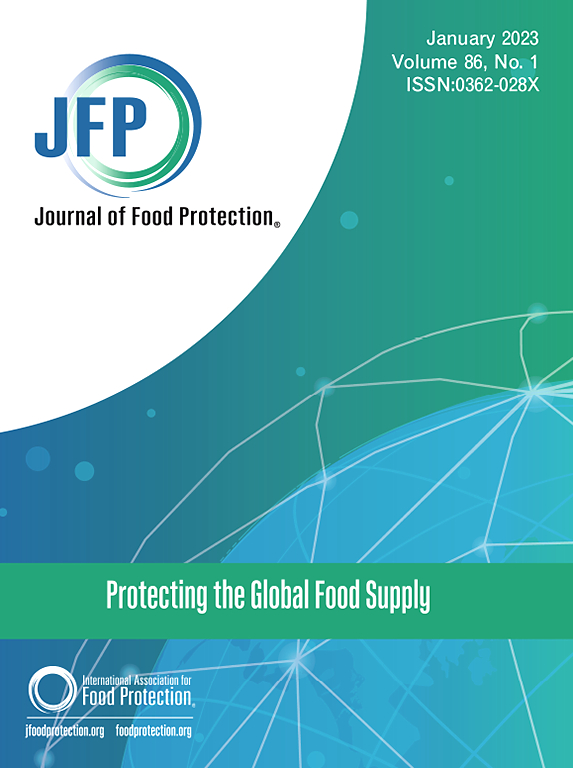Unexplained Illnesses Associated With a Subscription Meal Service, 2022
IF 2.1
4区 农林科学
Q3 BIOTECHNOLOGY & APPLIED MICROBIOLOGY
引用次数: 0
Abstract
In recent years, shifting consumer demands have led to changes in the types of foods produced and how consumers obtain them. A growing demand for non–meat-based proteins has led to the development of new plant-based protein products. Simultaneously, there has been an increase in subscription-based meal services. In 2022, a subscription-based meal service, Daily Harvest, launched a new plant-based protein line of products called Crumbles. Shortly, thereafter, consumer complaints of gastrointestinal symptoms were heard, and Daily Harvest recalled the French Lentil and Leek Crumbles, which contained a unique ingredient, tara flour. We obtained case data from the Marler Clark law firm and conducted an epidemiologic investigation of the relationship between illness and consumption of food products distributed by Daily Harvest. We independently reviewed data on 338 people, including 264 people with supplemental food exposure information, and calculated minimal attack rates. Of 264 people who completed the supplemental survey, all (100%) consumed the Lentil and Leek Crumbles. Minimal attack rates were highest for the Lentil and Leek Crumbles (1.4%) followed by the Walnut and Thyme Crumbles (0.45%). Among 213 subscribers, the minimal attack rate was highest for those who purchased three or more units of Lentil and Leek Crumbles (3.72%) compared to those who purchased two units (2.28%) or one unit (1.50%). The strength of the association and the increased risk of illness among persons who consumed Lentil and Leek Crumbles, but not other products that shared ingredients (other than tara flour) with Lentil and Leek Crumbles, suggests that tara flour was likely the source of illness, although a specific etiology remains unknown. This study highlights the value of using nontraditional data to identify sources of illness. Further research is needed to understand the safety of tara flour for human consumption.
与订餐服务有关的不明原因疾病,2022 年。
近年来,消费者需求的变化导致了食品生产类型和消费者获取方式的改变。人们对非肉类蛋白质的需求日益增长,这促使人们开发新的植物性蛋白质产品。与此同时,订阅式膳食服务也在增加。2022 年,订餐服务公司 Daily Harvest 推出了名为 Crumbles 的新型植物蛋白产品系列。此后不久,消费者投诉出现胃肠道症状,每日丰收公司召回了含有一种独特成分--塔拉面粉的法式扁豆韭菜碎。我们从马勒-克拉克(Marler Clark)律师事务所获得了病例数据,并对疾病与食用 "每日丰收 "经销的食品之间的关系进行了流行病学调查。我们独立审查了 338 人的数据,其中 264 人补充了食品接触信息,并计算了最低发病率。在完成补充调查的 264 人中,所有人(100%)都食用了扁豆韭菜碎。小扁豆和韭菜面包屑的最低致病率最高(1.4%),其次是核桃和百里香面包屑(0.45%)。在 213 名订户中,购买三份或更多扁豆韭菜面包屑的订户发病率最高(3.7%),而购买两份(2.3%)或一份(1.5%)的订户发病率最低。这种关联的强度以及食用扁豆韭菜碎(而非与扁豆韭菜碎共享配料(塔拉面粉除外)的其他产品)的人患病风险的增加表明,塔拉面粉很可能是致病源,尽管具体病因仍不清楚。这项研究强调了使用非传统数据来确定疾病来源的价值。要了解供人类食用的塔拉面粉的安全性,还需要进一步的研究。
本文章由计算机程序翻译,如有差异,请以英文原文为准。
求助全文
约1分钟内获得全文
求助全文
来源期刊

Journal of food protection
工程技术-生物工程与应用微生物
CiteScore
4.20
自引率
5.00%
发文量
296
审稿时长
2.5 months
期刊介绍:
The Journal of Food Protection® (JFP) is an international, monthly scientific journal in the English language published by the International Association for Food Protection (IAFP). JFP publishes research and review articles on all aspects of food protection and safety. Major emphases of JFP are placed on studies dealing with:
Tracking, detecting (including traditional, molecular, and real-time), inactivating, and controlling food-related hazards, including microorganisms (including antibiotic resistance), microbial (mycotoxins, seafood toxins) and non-microbial toxins (heavy metals, pesticides, veterinary drug residues, migrants from food packaging, and processing contaminants), allergens and pests (insects, rodents) in human food, pet food and animal feed throughout the food chain;
Microbiological food quality and traditional/novel methods to assay microbiological food quality;
Prevention of food-related hazards and food spoilage through food preservatives and thermal/non-thermal processes, including process validation;
Food fermentations and food-related probiotics;
Safe food handling practices during pre-harvest, harvest, post-harvest, distribution and consumption, including food safety education for retailers, foodservice, and consumers;
Risk assessments for food-related hazards;
Economic impact of food-related hazards, foodborne illness, food loss, food spoilage, and adulterated foods;
Food fraud, food authentication, food defense, and foodborne disease outbreak investigations.
 求助内容:
求助内容: 应助结果提醒方式:
应助结果提醒方式:


